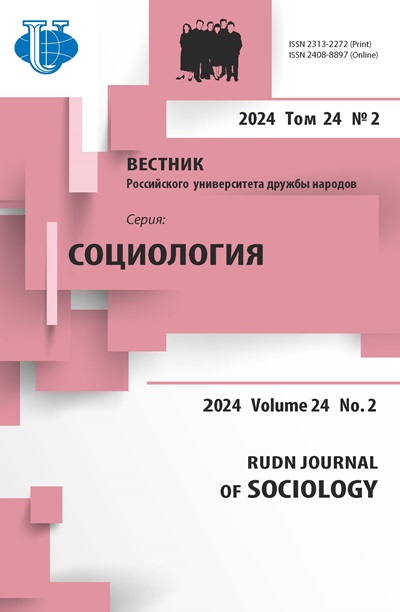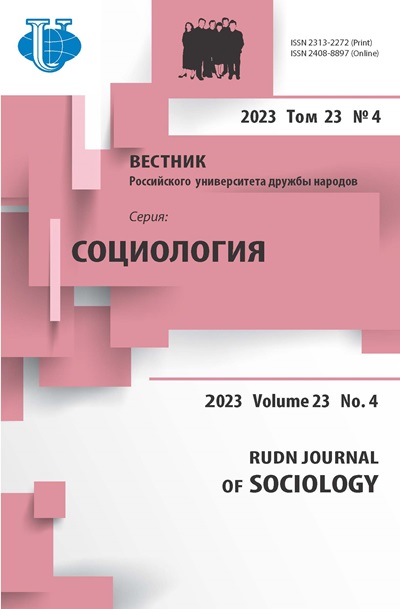На пути к космополитической социальной теории: опыт эпистемологического исследования
- Авторы: Джонг А.1
-
Учреждения:
- Российский университет дружбы народов
- Выпуск: Том 23, № 4 (2023)
- Страницы: 683-703
- Раздел: Вопросы истории, теории и методологии
- URL: https://journals.rudn.ru/sociology/article/view/37267
- DOI: https://doi.org/10.22363/2313-2272-2023-23-4-683-703
- EDN: https://elibrary.ru/FXICHV
Цитировать
Полный текст
Аннотация
Возрастающая значимость глобальных феноменов диктует необходимость новой социальной теории, которая, признавая уникальные характеристики социальных явлений, способна придать им научный смысл на транснациональном уровне, а также в соотношении с друг другом. Текучая и многоуровневая природа глобальных феноменов, ставшая причиной глубочайшей неопределенности и небезопасности в мировых масштабах, требует особых подходов к изучению новых типов социальности, что привело к пересмотру многих положений социальной теории в отношении глобализации и все возрастающей взаимосвязи социальных процессов и явлений [1; 33]. Здесь можно выделить два основных подхода: ревизионизм стремится модифицировать социальные науки в соответствии с новой онтологией современного мира и опираясь на реконструкцию исходных постулатов социальной мысли, особенно социологии [2; 17; 30; 34]; радикально настроенные исследователи, напротив, утверждают, что на основе исторических и теоретических характеристик социальных наук невозможно изменить и адаптировать их к требованиям современного мира, а потому они нуждаются в замене [1; 4; 18; 23; 35-37]. В статье представлена попытка найти компромисс между этим крайними позициями, сочетая критику эпистемологических оснований социальных наук и используя постфундационалистскую философию для разработки космополитической социальной теории. Глобальная космополитизация и возрастающая роль взаимозависимости социальных феноменов требуют такой социальной теории, которая бы учитывала единичность, но концептуализировала ее в контексте транснациональных и глобальных трендов с помощью понятий текучести и неопределенности. Автор полагает, что в основе современных социальных наук и теорий (возникших в эпоху модерна) лежат три историко-эпистемологических положения, или эпистемы, - модерна, нации и империи. Любая космополитическая теория должна, в первую очередь, критиковать и отказываться от этих эпистем, что автор и делает, апеллируя к двум эпистемологическим антиномиям - универсализма/партикуляризма и эссенциализма/релятивизма. Постфундационализм и идея социальных конфигураций представлены в статье как ядро космополитической социальной теории, которая сможет преодолеть как противоречия, порождаемые тремя эпистемами, так и две антиномии.
Ключевые слова
Об авторах
Аббас Джонг
Российский университет дружбы народов
Автор, ответственный за переписку.
Email: dzhong-a@rudn.ru
кандидат социологических наук, научный сотрудник кафедры истории философии ул. Миклухо-Маклая, 6, Москва, 117198, Россия
Список литературы
- Connell R. Southern Theory: The Global Dynamics of Knowledge in Social Science. London; 2007.
- Go J. Postcolonial Thought and Social Theory. Oxford; 2016.
- Beck U. The Metamorphosis of the World: How Climate Change is Transforming Our Concept of the World. Cambridge; 2016.
- Beck U. Cosmopolitan sociology: Outline of a paradigm shift. Rovisco M., Nowicka M. (Eds.). The Ashgate Research Companion to Cosmopolitanism. London-New York; 2016.
- Gutierrez Rodriguez E., Boatcă M., Costa S. (Eds.). Decolonizing European Sociology: Transdisciplinary Approaches. London-New York; 2016.
- Alatas S.F. Eurocentrism. Blackwell Encyclopedia of Sociology. Oxford; 2016.
- McLennan G. Sociology, eurocentrism and postcolonial theory. European Journal of Social Theory. 2003; 6 (1).
- Chakrabarty D. Provincializing Europe: Postcolonial Thought and Historical Difference. Princeton; 2000.
- Jong A. Social configurations in the moment of post-foundationalism. Frontiers in Sociology. 2023; 7.
- Jong A. Modern episteme, methodological nationalism and the politics of transnationalism. Frontiers in Political Science. 2023; 5.
- Nederveen Pieterse J. Globalization and Culture: Global Mélange. Washington; 2019.
- Nederveen Pieterse J. What is global studies? Globalizations. 2013; 10 (4).
- Juergensmeyer M. What is global studies? Globalizations. 2013; 10 (6).
- Dicken P. Global Shift: Mapping the Changing Contours of the World Economy. London; 2007.
- Darian-Smith E., McCarty P.C. The Global Turn. Berkeley; 2019.
- Shaw M. Theory of the Global State. Cambridge University Press; 2000.
- Albrow M. The global shift and its consequences for sociology. Advances in Sociological Knowledge. Wiesbaden; 2004.
- Bauman Z. Society under Siege. Cambridge; 2002.
- Bauman Z. Liquid Modernity. Cambridge; 2000.
- Bauman Z. Globalization: The Human Consequences. New York; 2000.
- Arjomand S.A. Social Theory and Regional Studies in the Global Age. Albany; 2014.
- Amelina A.D., Nergiz D., Faist T., Glick Schiller N. (Eds.). Beyond Methodological Nationalism: Research Methodologies for Cross-Border Studies. Routledge; 2012.
- Beck U., Sznaider N. Unpacking cosmopolitanism for the social sciences: A research agenda. British Journal of Sociology. 2006; 57 (1).
- Featherstone M. Global Culture: Nationalism, Globalization and Modernity. Sage; 1990.
- Giddens A. Runaway World: How Globalization is Reshaping Our Lives. London; 1999.
- Held D. Global Transformations: Politics, Economics and Culture. Stanford; 1999.
- Held D. Cosmopolitanism: Ideals and Realities. Cambridge; 2010.
- Held D., McGrew A. Globalization/Anti-Globalization: Beyond the Great Divide. Cambridge; 2007.
- Lyotard J.-F. The Postmodern Condition: A Report on Knowledge. Manchester; 1986.
- Seidman S. The Postmodern Turn: New Perspectives on Social Theory. Cambridge; 1994.
- Wallerstein I. World-Systems Analysis: An Introduction. Durham; 2004.
- Robinson W.I. Social theory and globalization: The rise of a transnational state. Theory and Society. 2001; 30 (2).
- Robinson W.I. Beyond nation-state paradigms: Globalization, sociology, and the challenge of transnational studies. Sociological Forum. 1998; 13 (4).
- Giddens A. New Rules of Sociological Method: A Positive Critique of Interpretative Sociologies. London; 1976.
- Latour B. Reassembling the Social: An Introduction to Actor-Network-Theory. Oxford; 2005.
- Beck U. Zombie categories: Interview with Ulrich Beck. Beck U., Beck-Gernsheim E. (Eds.). Individualization: Institutionalized Individualism and Its Social and Political Consequences. Lanham; 2002.
- Beck U. Methodological cosmopolitanism. Blaug R., Schwarzmantel J. (Eds.). Democracy: A Reader. New York; 2016.
- Wallerstein I. Open the Social Sciences: Report of the Gulbenkian Commission on the Restructuring of the Social Sciences. Stanford; 1996.
- Wittrock B. History, sociology, and the reconfiguration of civilizations. Arjomand S.A. (Ed.). Social Theory and Regional Studies in the Global Age. Albany; 2014.
- Chernilo D. Social theory’s methodological nationalism: Myth and reality. European Journal of Social Theory. 2006; 9 (1).
- Mahoney J. The Logic of Social Science. Princeton; 2021.
- Foucault M. Society Must Be Defended. London; 2003.
- Beck U. Risk Society: Towards a New Modernity. London; 1992.
- Beck U. Varieties of second modernity and the cosmopolitan vision. Theory, Culture & Society. 2016; 33.
- Meyer J.W., Boli J., Thomas G.M., Ramirez F.O. World society and the nation-state. Americal Journal of Sociology. 1997; 103 (1).
- Meyer J.W. The changing cultural content of the nation-state: A world society perspective. Steinmetz G. (Ed.). State/Culture. Ithaca; 2018.
- Arjomand S., Tiryakian E. (Eds.). Rethinking Civilizational Analysis. London; 2004.
- Smith L.T. Decolonizing Methodologies: Research and Indigenous Peoples. London; 2012.
- Mauro F., Hardison P.D. Traditional knowledge of indigenous and local communities: International debate and policy initiatives. Ecological Applications. 2000; 10 (5).
- Beck U. World Risk Society. Cambridge; 1999.
- Jameson F. Postmodernism, or, The Cultural Logic of Late Capitalism. Durham; 2020.
- Habermas J. The Postnational Constellation: Political Essays. Cambridge; 2001.
- Foucault M. The Order of Things: An Archaeology of the Human Sciences. London-New York; 1966.
- Foucault M. Archaeology of Knowledge. London-New York: 2002.
- Beck U. The cosmopolitan condition. Theory, Culture & Society. 2007; 24 (7-8)
- Beck U. The Cosmopolitan Vision. Cambridge; 2006.
- Beck U., Blok A., Tyfield D., Zhang J.Y. Cosmopolitan communities of climate risk: Conceptual and empirical suggestions for a new research agenda. Global Networks. 2013; 13 (1).
- Beck U., Levy D. Cosmopolitanized nations: Re-imagining collectivity in world risk society. Theory, Culture & Society. 2013; 30 (2).
- Marchart O. Post-Foundational Political Thought: Political Difference in Nancy, Lefort, Badiou and Laclau. Edinburgh; 2007.
- Frisby D., Sayer D. Society. Chichester; 1986.
- Giddens A. The Constitution of Society: Outline of the Theory of Structuration. Cambridge; 1984.
- Sayer A. Method in Social Science. London; 2010.
- Reckwitz A. The Society of Singularities. Cambridge; 2020.
- Ghamari-Tabrizi B. Can Burawoy make everybody happy? Comments on public sociology. Critical Sociology. 2005; 31 (3).
- Jong A., Ali R. Political Islam as an incomplete and contested category: A post-foundationalist revision. Religions. 2023; 14 (8).
- Oksala J. Foucault on Freedom. Cambridge; 2005.
- Peters R. The episteme and the historical a priori: On Foucault’s archaeological method. Journal of French and Francophone Philosophy. 2021; 29 (1-2).
- Foucault M. Orders of discourse. Social Science Information. 1971; 10 (2).
- Herzog D. Without Foundations. Ithaca-London; 1985.
- Burawoy M. Public Sociologies in Global Context. Ithaca; 2003.
- Wimmer A., Glick Schiller N. Methodological nationalism and beyond: Nation-state building, migration and the social sciences. Global Networks. 2002; 2 (4).
- Wimmer A., Glick Schiller N. Methodological nationalism, the social sciences, and the study of migration: An essay in historical epistemology. International Migration Review. 2003; 37 (3).
- Chernilo D. A Social Theory of the Nation-State. London-New York; 2008.
- Giddens A. The Class Structure of the Advanced Societies. London; 1973.
- Calhoun C. Nationalism, political community and the representation of society. European Journal of Social Theory. 1999; 2 (2).
- Toulmin S. Cosmopolis: The Hidden Agenda of Modernity. Chicago; 1990.
- Mandelbaum M.M. The Nation/State Fantasy: A Psychoanalytical Genealogy of Nationalism. Cham; 2020.
- Jong A., Entezari A. World risk society, reconfiguration of religion, and transnational religious organizations. Journal of Strategic Management Studies. 2023; 14 (54).
- Jong A. Explaining the patterns of globalization, consumption and everyday-life. Journal of Business Administration Research. 2016; 8 (15).
- Jong A. World risk society and constructing cosmopolitan realities: A Bourdieusian critique of risk society. Frontiers of Sociology. 2022; 7.
- Jong A. Construction of identity patterns in the process of globalization. Journal of Strategic Management Studies. 2016; 7 (26).
- Jong A. Transnational configurations and cosmopolitanization. International Journal of Interdisciplinary Social and Community Studies. 2022; 17 (2).
- Go J. Global fields and imperial forms: Field theory and the British and American Empires. Sociological Theory. 2008; 26 (3).
- Blok A., Selchow S. Special theme introduction: Methodological cosmopolitanism across the socio-cultural sciences. Global Networks. 2020; 20 (3).
- Blok A. Towards cosmopolitan middle-range theorizing: A metamorphosis in the practice of social theory? Current Sociology. 2015; 63 (1).
- Beck U. Interview with Ulrich Beck. Journal of Consumer Culture. 2001; 1 (2).
- Beck U. World at Risk. Cambridge; 2007.
- Rehbein B. Critical Theory After the Rise of the Global South Kaleidoscopic Dialectic. New York; 2015.
- Burr V. Social Constructionism. London-New York; 2015.
- Laclau E. The impossibility of society. Ideology and Power in the Age of Lenin in Ruins. London; 1991.
- Rehbein B. Critical theory after the rise of the Global South. Social Theory and Asian Dialogues. Singapore; 2018.
- Akiwowo A. Universalism and indigenisation in sociological theory: Introduction. International Sociology. 1988; 3 (2).
- Mahmood S. Secularism, hermeneutics, and empire: The politics of Islamic reformation. Public Culture. 2006; 18 (2).
- Bevir M. Anti-foundationalism. Bevir M. (Ed.). Encyclopedia of Political Theory. Thousand Oaks; 2010.
- Butler J. Contingent foundations: Feminism and the question of postmodernism. Butler J., Scott J.W. (Eds.). Feminists Theorize the Political. London-New York; 1992.
- Spivak G. Foundations and cultural studies. Silverman H.J. (Ed.). Questioning Foundations Truth/Subjectivity/Culture. New York-London; 1993.
- Trogdon K. Grounding: necessary or contingent? Pacific Philosophical Quaterly. 2013; 94 (4).
- Butler J., Laclau E., Zizek S. Contingency, Hegemony, Universality: Contemporary Dialogues on the Left. London; 2000.
- Conrad S. What is Global History? Princeton; 2016.
- Adorno T. Positivist Dispute in German Sociology. Portsmouth; 1981.
- Wimmer A. Nationalist Exclusion and Ethnic Conflict: Shadows of Modernity. Cambridge; 2002.
- Mosleh A.A., Jong A. Iran and covid-19: Institutional configurations. Pieterse J.N., Lim H., Khondker H. (Eds.). Covid-19 and Governance. London-New York; 2021.
- Faist T. The Volume and Dynamics of International Migration and Transnational Social Spaces. Oxford; 2000.
- Hagen-Zanker J. Why do people migrate? A review of the theoretical literature. 2008. URL: http://www.ssrn.com/abstract=1105657.
- Hammar T., Brochmann G., Tamas K., Faist T. (Eds.). International Migration, Immobility and Development. London; 1997.
- Bijak J. Forecasting International Migration: Selected Theories, Models, and Methods. Warsaw; 2006.
- Massey D.S,, Arango J., Hugo G., Kouaouci A., Pellegrino A., Taylor J.E. Theories of international migration: A review and appraisal. Population and Development Review. 1993; 19 (3).
- Nair P. Postcolonial theories of migration. Encyclopedia of Global Human Migration. New Jersey; 2013.














